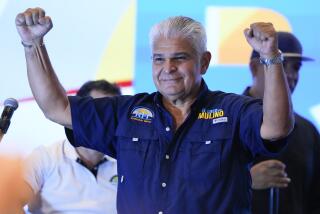Bad Dream Under a Panama Hat : Noriega: If the U.S. government did snatch the general, could he turn into George Bush’s tar baby?
- Share via
I had a dream--a bad one.
In it, Manuel Noriega was turned over to the American authorities after a coup in Panama, flown to Miami and clapped into jail.
At a crowded hearing the next morning, the prosecutor read the two indictments charging the strongman with drug trafficking and money-laundering. The prosecutor also asked that Noriega be held without bail. Nevertheless, the magistrate set bail at $5 million, which was promptly paid in cash, in hundred-dollar bills, by a lawyer known for defending drug kingpins.
At a pretrial hearing, a battery of Miami, Washington and New York lawyers appeared and asserted that Noriega had been kidnaped in violation of Panamian sovereignty. The U.S. attorney presented a Justice Department opinion that jurisdiction of foreign states could be overridden to apprehend violators of American law.
The Panamanian government charged a violation of international law, and a famous Harvard Law School professor volunteered to argue the case before the International Court of Justice in The Hague. Atty. Gen. Dick Thornburgh said the United States would not accept the World Court’s jurisdiction.
Meanwhile, Noriega, free on bail, traveled the country, with a bevy of FBI agents, lecturing for $25,000 a pop, giving news conferences and appearing on television. He broke the one-month record for number of appearances on ABC’s “Nightline” previously held by the Rev. Jim Bakker.
After six months of uproar, the U.S. district court judge in Miami ordered that the case proceed to trial. Thereupon Noriega’s lawyers announced that they would introduce the “Ollie North defense”--they asserted that the general’s drug activities had been known and sanctioned at the highest levels of the United States government in the superior interest of combating the Sandinistas in Nicaragua.
The defense demanded that a subpoena be issued for President Bush who, as vice president, had met with Noriega, and they asked for the records of the CIA about Noriega’s services for the agency and his dealings with the late director, William J. Casey. Several counts of the indictments were quashed when the CIA refused to release its files.
A year after Noriega’s capture, the court was still hearing arguments on whether Bush could be subpoenaed and the World Court was in preliminary hearings on Panama’s complaint.
By now, Noriega had his own television talk show, called “Miami Advice.” Drug Czar William J. Bennett was a frequent guest.
I awoke from my dream about the time President Bush was offering Noriega a pardon on condition he go back to Panama.
More to Read
Sign up for Essential California
The most important California stories and recommendations in your inbox every morning.
You may occasionally receive promotional content from the Los Angeles Times.










